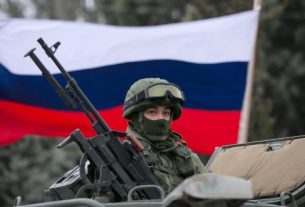Russian strikes wound dozens
Russian missiles targeted Ukraine’s two biggest cities on Tuesday morning, damaging apartment buildings and killing at least six people.
The Russian barrage included more than 40 ballistic, cruise, anti-aircraft and guided missiles, officials said.
It injured at least 20 people in four districts of Kyiv, the capital, including a 13-year-old boy, according to Mayor Vitalii Klitschko.
In Kharkiv, in northeast Ukraine, the onslaught injured 42 people as the missiles damaged around 30 residential buildings and shattered nearly a thousand apartment windows in icy weather, regional Governor Oleh Syniehubov said.
The 1,500-kilometre front line in Ukraine has barely moved in several months. Both sides’ inability to deliver a knockout punch on the battlefield has pushed the fighting toward trench and artillery warfare.
Analysts say the Kremlin’s forces stockpiled missiles at the end of last year to supply a winter campaign of aerial bombardment.
The attacks on Kyiv and Kharkiv came two days after Moscow-installed officials in eastern Ukraine claimed that Ukrainian shelling killed 27 people on the outskirts of Russian-occupied Donetsk. Kremlin spokesman Dmitry Peskov called it a “monstrous terrorist act.”
The Ukrainian military, however, denied it had anything to do with the attack.
Pentagon runs out of funds to support Ukraine
For the first time since the US created the international group to support Ukraine in April 2022, Washington will host the monthly gathering of about 50 countries without any money allocated to fund the Ukrainian war effort.
This means it will be unable to send the ammunition and missiles that Kyiv needs to fend off Russia.
While waiting for Congress to pass a budget and potentially approve more money for Ukraine’s fight, the US will be looking to allies to keep bridging the gap.
The Pentagon announced its last security assistance for Ukraine on December 27, a $250 million (€230 million) package that included 155 mm rounds, Stinger anti-aircraft missiles and other high-demand items drawn from existing US stockpiles.
The US has not been able to provide additional munitions since then because the money for replenishing those stockpiles has run out, with Congress yet to approve more funds.
More than $110 billion (€101 billion) in aid for both Ukraine and Israel is stalled over disagreements between Congress and the White House over other priorities, including additional security for the US-Mexico border.
Meanwhile, Russia has shown no willingness to end its conflict in Ukraine. On Monday, Kremlin Foreign Minister Sergei Lavrov told a UN meeting that peace plans presented by Ukraine and its Western “masters” are “only used as cover to continue war and continue getting money from Western taxpayers.”
NATO signs key ammunition contract
NATO signed on Tuesday a $1.2 billion (€1.1 billion) contract to make tens of thousands of artillery rounds to replenish the dwindling stocks of its member countries as they supply ammunition to Ukraine to help it defeat Russia’s invasion.
The contract will allow for the purchase of 220,000 rounds of 155mm ammunition, the most widely sought-after artillery shell, according to NATO’s support and procurement agency.
It will ultimately allow allies to backfill their arsenals and provide Ukraine with more ammunition.
“This is important to defend our own territory, to build up our own stocks, but also to continue to support Ukraine,” NATO Secretary-General Jens Stoltenberg told reporters.
“We cannot allow President Putin to win in Ukraine,” he added. “That would be a tragedy for the Ukrainians and dangerous for all of us.”
Ukraine was firing around 4,000 to 7,000 artillery shells each day last summer, while Russia was launching more than 20,000 shells daily in its neighbour’s territory, according to European Union estimates.
Russia’s arms industry far outweighs Ukraine’s and Kyiv needs help to match Moscow’s firepower.
But the shells will not arrive quickly – delivery on orders takes anywhere from 24 to 36 months, the NATO agency said.__Courtesy EuroNews





